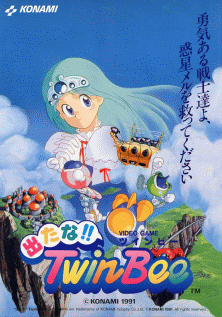Detana!! TwinBee
| Detana!! Twinbee | |
|---|---|
|
Japanese sales flyer | |
| Developer(s) | Konami |
| Publisher(s) | Konami |
| Composer(s) |
Michiru Yamane Hidenori Maezawa Masae Nakashima |
| Platform(s) | Arcade, Sharp X68000, PC Engine, Microsoft Windows, Sega Saturn, PlayStation Mobile Phones, PlayStation Portable, Virtual Console, PlayStation Network, Xbox 360 |
| Release |
Arcade Sharp X68000
PC Engine
Mobile Phones
Virtual Console
PlayStation Network
Xbox 360
Windows Computers
EGG (Windows Store)
|
| Genre(s) | Vertical Shooter |
| Mode(s) | 1 or 2 player co-operative |
| Cabinet | Upright |
| Arcade system | JAMMA |
| CPU | Motorola 68000 at 16 MHz |
| Sound |
Yamaha YM2151 K053260 |
| Display | Raster, 225 x 255 pixels (Vertical) |

Detana!! TwinBee (出たな!! ツインビー, "Here Comes TwinBee!!"), originally released outside Japan as Bells & Whistles, is a vertical-scrolling shoot-'em-up game originally released by Konami in 1991 as a coin-operated video game. It is the fifth game in the TwinBee series and the second released for the arcades following the original TwinBee (the previous sequels were released directly to home consoles). In Japan, Detana!! TwinBee was ported to the X68000 computer in 1991[1] and to the PC Engine in 1992,[2] as well as for the PlayStation and Sega Saturn in the compilation Detana TwinBee Yahoo! Deluxe Pack and for the PlayStation Portable in TwinBee Portable. The PC Engine port of the game was released for the Wii Virtual Console in North America and Europe in 2009 as a "Hanabi Festival" release.[3] The game was released for the PlayStation Network in Japan on June 16, 2010. The November 24 2010, the game was released on Xbox 360, it was included on the "Game Pack 012" of Game Room gaming service.
Detana!! TwinBee marked the debut of Japanese animator Shujiro Hamakawa (credited under the pen name Shuzilow.HA) as the series' primary character designer for every subsequent installment. Detana!! TwinBee was awarded "Best Shooting Game of 1991" by the Japanese arcade game magazine Gamest.[4]
Plot
Set several years after the events of the original TwinBee, TwinBee and WinBee are relaxing at their island when they receive an SOS signal from the distant planet of Meru. The signal contains a message sent by Queen Melora, who pleads for the salvation of her planet from the invading forces of the evil alien Iva. TwinBee and his friends decides to set off to outer space to defeat the forces of Iva and save Planet Meru.[5] Detana!! marks the first appearance of TwinBee's and WinBee's respective pilots, Light and Pastel, who became prominent characters in many subsequent TwinBee video games and related media, although they were originally unnamed in this game (the characters were given their names in the audio drama TwinBee Paradise).
Gameplay
Aside from the improve graphics and sounds compared to previous TwinBee installments, the gameplay in Detana follows the same conventions established in the arcade version of the original. As usual, the game can be played by up to two players, with player 1 piloting TwinBee, while player 2 pilots WinBee. Controls consist of an eight-way joystick for moving the ship and two buttons. In the Japanese version, one button is used to fire the gun at airborne enemies while the other is used to drop bombs to the ground. In the international arcade release (Bell & Whistles), both buttons are used to do shoot and drop bombs at the same time. This time, holding down the shooting button will cause a power-meter at the bottom of the screen to fill up, allowing the player to fire a "Big Shot" attack when releasing the button.
The power-ups consist of bells which can be uncovered by shooting the floating clouds, as well as items uncovered by destroying land enemies. Like in the original TwinBee, the player can shoot the floating bells to change their colors. In addition to the five different colors in the original TwinBee (yellow, white, blue, green, and red), there are two new additional bells as well: a purple bell that provides a "tail shield" that activates multiple barriers around the player's ship and black bell which decreases the player's speed.
The mini-bell and the lucky star from the original TwinBee return as well. GwinBee, a ship similar to TwinBee and WinBee, also appears in the game, allowing the player to combine its ship with GwinBee to fire wider fire beams. Two players can also align their ships side-by-side to achieve the same effect or align their ships vertically for a powerful five-way spread. If both players align their ships with GwinBee between them, he will spring out and destroy all on-screen enemies.
The game consists of seven stages; once completed, the player can replay it for a harder second round. The game will be entirely over if the final stage is cleared again; but after running out of lives, the player can continue and receive a "free" power-up.[6]
References
- ↑ Konami website staff. "List of X68000 games by Konami" (in Japanese). Archived from the original on November 8, 1996.
- ↑ Konami website staff. "List of PC Engine games by Konami" (in Japanese). Archived from the original on November 8, 1996.
- ↑ "One WiiWare Game and Two Virtual Console Games Added to Wii Shop Channel". Nintendo of America. 2009-03-23. Retrieved 2009-03-25.
- ↑ Editorial Staff of Gamest (February 1992). "Gamest's Fifth Annual Grand Prix". Gamest (in Japanese) (Volume 68): 8. Archived from the original on 2008-07-08.
- ↑ "Detana!! TwinBee flyer at The Arcade Flyers Archive".
- ↑ Konami. Detana!! TwinBee/Bells & Whistles (in Japanese and English). Level/area: Operator's manual, page 2 and 4.
